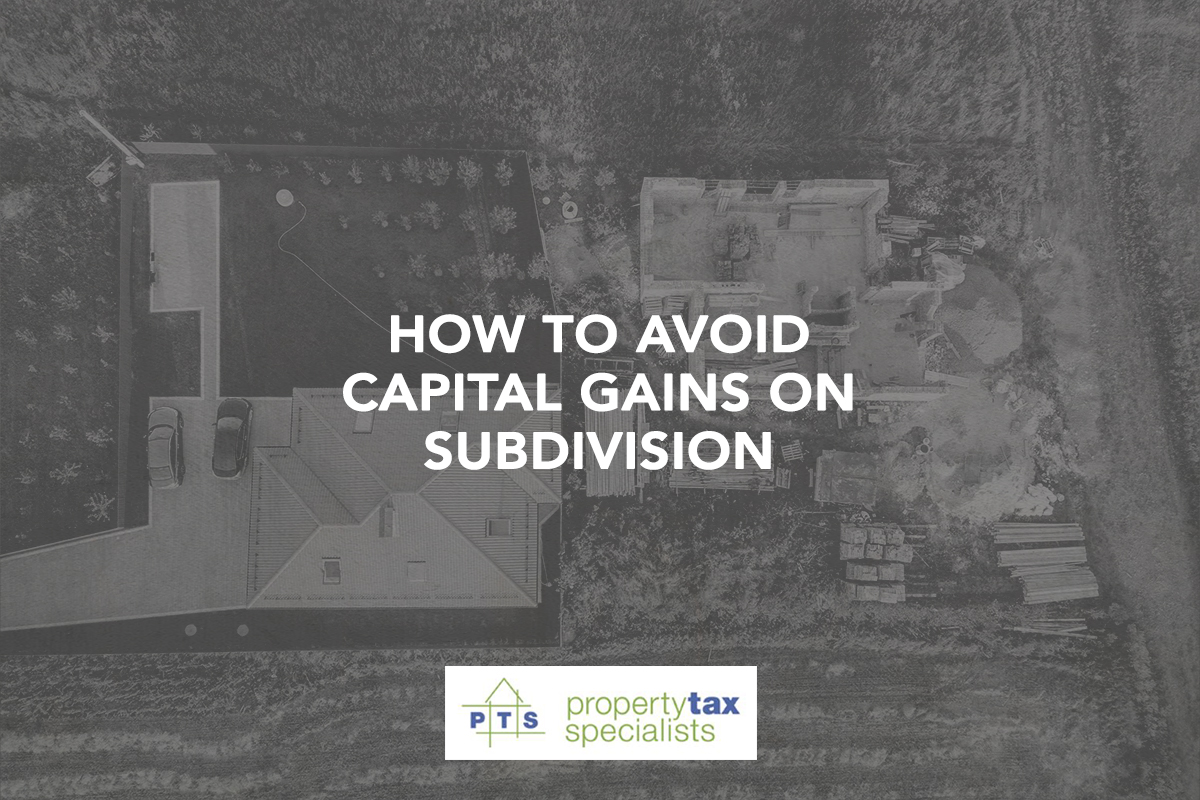How to (Legally) Avoid Capital Gains Tax on a Subdivision
The Australian property market has experienced rapid price growth in recent years, leading many homeowners to consider subdividing and selling vacant portions of their land for profit.
However, capital gains tax (CGT) can take a significant bite from the proceeds from such subdivision sales.
Fortunately, with proper planning and advice, there are legal ways to minimise or even eliminate capital gains tax when subdividing your property.
Here’s what you need to know.
Capital Gains vs Income Tax on Property Sales
When you sell a property in Australia, the profits may be subject to capital gains tax or treated as regular assessable income for tax purposes, depending on the nature of the sale. This distinction plays a major role in how much tax you’ll owe.
You will have to pay capital gains tax when you sell a property that the Australian Tax Office (ATO) defines as a “Capital Gains Tax (CGT) asset” – most commonly your main residence or an investment property held for rental income and long-term capital appreciation. Only the increase in value during the time you owned the asset is taxed, usually at preferential rates compared to ordinary income.
However, if the ATO deems the sale of land to be part of a commercial business operation, the profits are considered regular assessable income. This could apply if you are carrying out property development activities, regularly subdividing and selling land, or undertaking one-off profit-making ventures focused on selling property.
Rates can be as high 45% for the top individual tax brackets.
Some examples of subdivision sales being treated as capital gains or ordinary income:
Capital Gains
- Selling a vacant portion of a property owned for 10+ years after subdividing
- Occasionally subdividing land held for residential or commercial rental purposes.
Ordinary Income
- Subdividing and selling multiple vacant land plots across a short time period
- Purchasing rural property specifically to subdivide and sell the plots
As you can see, the distinction between capital gains and income tax treatment lies in the intention behind the sale and the scale or frequency of subdivision projects.
Factors That Determine CGT vs Income Tax Treatment
When assessing whether a subdivision sale should be treated as a capital gain or taxable income, the ATO examines many aspects of the circumstances behind the sale. Some key factors include:
Intentions Behind Purchase and Subdivision
The original intention when the land was acquired plays a major role. If you purchased the property with a clear plan to subdivide and sell the plots for profit, the ATO is more likely to treat the proceeds as ordinary assessable income rather than capital gains, and you will have to pay tax accordingly. Evidence like development applications and contracts with builders submitted shortly after purchase may signal profit-seeking motives.
Scale and Complexity of Subdivision
Larger, more complex subdivisions involving rezoning approvals, land clearing, marketing materials and extensive infrastructure require greater effort and coordination. The ATO associates this with commercial property development projects, while simpler subdivisions are more likely viewed as one-off capital sale events.
Involvement in Property Development
If you undertake subdivision and land sales as an ongoing business activity, this makes it more likely that profits will be subject to ordinary income tax rates. Factors like having a registered development company, seeking regular subdivisions, and overseeing marketing suggest commercial operations.
Relationships with Developers/Contractors
Entering into agreements with property developers, project managers, or marketing agents implies the subdivision is a commercial undertaking. The ATO pays close attention to any arrangements that indicate joint property trading enterprises.
Note: These are not the only criteria used, but they provide a sampling of what the ATO evaluates when determining applicable taxes.
Claiming Main Residence Exemption on Subdivisions to Avoid CGT
If the ATO deems your property subdivision to generate a capital gain (rather than ordinary income), you may be able to utilise the main residence exemption to avoid capital gains tax (CGT) entirely.
Requirements for Full Exemption
To qualify for the full CGT main residence exemption on the sale of one subdivided lot, you must:
- Occupy the dwelling on one subdivided lot as your main residence before and after the subdivision
- Sell the vacant land within two years of moving into the retained residence
Partial Exemption Calculation
If you rent out the retained property, occupy it for short periods, or sell the vacant land lot later than 2 years after moving in, you may still receive a partial CGT exemption. The percentage is based on the proportion of your ownership period when it was your main residence.
Note: Be aware the ATO pays close attention to main residence exemption claims on subdivisions – incorrectly claiming can lead to tax, penalties, and interest. Consult a tax expert to ensure eligibility.
Key Takeaways
- This article specifically steered its focus towards capital gains tax subdivision, but there are a plethora of other factors that need to be considered, like the GST margin scheme.
- For example, if the Commissioner has deemed the sale of subdivided land to have generated ordinary income, further assessments are required to establish whether the transaction was for business purposes or just a once-off profit-making undertaking.
- Either way, in most cases, the tax implications of the sale of subdivided land are rarely clear-cut.
- Therefore, you must work with a tax adviser before you even start the subdivision process. This way, you’ll know exactly what you are getting yourself into from a tax perspective and if it’s even financially worth going the subdivision route.
- They will also be able to help with potentially and legally avoiding CGT in these instances.
At Property Tax Specialists, we pride ourselves on providing award-winning property tax services to our clients. We have a team of experienced professionals knowledgeable in all aspects of the Australian taxation system, and we’re dedicated to ensuring that our clients receive the most favourable outcome possible.
If you need advice on selling your subdivided land, contact us today to schedule your initial consultation.
FAQs
How Does Capital Gains Tax Work on Subdivision?
CGT applies when you subdivide land and sell the newly created lots. The original cost of the entire property is apportioned between the lots to determine the cost base. The profit from selling each subdivided lot above the respective property’s cost-base portion is treated as a capital gain. You can apply CGT discounts if you’ve held the property for 12 months or longer before the sale.
Is There a CGT Discount on Subdivided Land?
Yes, you can claim CGT discounts on capital gains from selling subdivided land. If you held the rental property for at least 12 months before the sale, you can apply a 50% CGT discount as an individual to reduce your tax bill.
What Is the 6-Year Rule for Capital Gains Tax?
If you move out of your main residence, you may still qualify for a full CGT exemption for up to six years after vacating the property if certain criteria are met around renting out the home and your intentions to return to living there. This is commonly called the “6-year rule” and allows you to avoid paying capital gains tax in certain situations.
Disclaimer:
Please note that every effort has been made to ensure that the information provided in this guide is accurate. You should note, however, that the information is intended as a guide only, providing an overview of general information available to property buyers and investors. This guide is not intended to be an exhaustive source of information and should not be seen to constitute legal, tax or investment advice. You should, where necessary, seek your own advice for any legal, tax or investment issues raised in your affairs.



